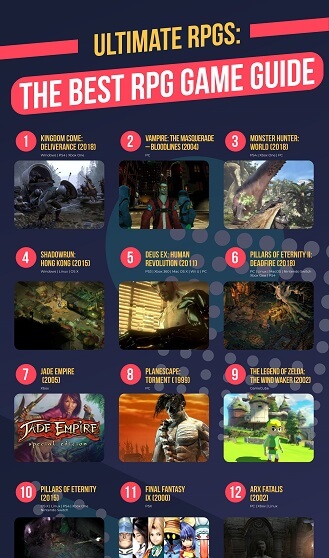
Level Up Your Game: A Comprehensive Guide to Mastering RPGs
Role-Playing Games (RPGs) offer a unique and deeply engaging experience, allowing players to step into the shoes of a character, shape their destiny, and explore sprawling worlds filled with compelling stories, challenging combat, and meaningful choices. Whether you’re a seasoned adventurer or a fledgling hero just starting your quest, understanding the core mechanics and strategies of RPGs is key to unlocking their full potential. This guide aims to equip you with the knowledge and tools you need to conquer any RPG that comes your way.
Understanding the RPG Landscape: A Genre Overview
Before diving into specific strategies, it’s crucial to understand the diverse landscape of RPGs. The genre encompasses a wide range of subgenres, each with its own unique flavor and focus:
-
Classic RPGs: Think Dungeons & Dragons, Baldur’s Gate, and Pillars of Eternity. These games typically feature turn-based or real-time-with-pause combat, a strong emphasis on character customization, and intricate storylines often inspired by tabletop RPGs. They are often known for their deep lore and complex systems.
-
Action RPGs (ARPGs): Examples include Diablo, Path of Exile, and Grim Dawn. These games prioritize fast-paced, real-time combat with hordes of enemies. Character progression is often driven by acquiring powerful loot and optimizing character builds for maximum damage output.
-
Japanese RPGs (JRPGs): Think Final Fantasy, Dragon Quest, and Persona. JRPGs often feature turn-based combat, distinct art styles, and character-driven narratives with a strong emphasis on themes like friendship, duty, and sacrifice. They often include unique mechanics like job systems and summon abilities.
-
Massively Multiplayer Online RPGs (MMORPGs): Games like World of Warcraft, Final Fantasy XIV, and Elder Scrolls Online offer persistent online worlds where players can interact with thousands of others, complete quests, participate in raids, and build communities. They are often characterized by their extensive endgame content and social aspects.
-
Open-World RPGs: Games like The Elder Scrolls V: Skyrim, The Witcher 3: Wild Hunt, and Cyberpunk 2077 prioritize exploration and player freedom. These games often feature sprawling open worlds with countless quests, secrets, and opportunities for emergent gameplay.
-
Tactical RPGs: Games like Fire Emblem, XCOM, and Divinity: Original Sin 2 focus on strategic combat on grid-based maps. These games require careful planning and positioning to overcome challenging encounters.
Understanding which subgenre you’re playing will help you anticipate the game’s mechanics and focus your efforts accordingly.
The Foundations of Character Creation: Building Your Hero
The first step in any RPG adventure is creating your character. This process typically involves selecting a race, class, and attributes, each of which will significantly impact your gameplay experience.
-
Race: Your character’s race often provides inherent stat bonuses, resistances, and unique abilities. Consider how these traits align with your desired playstyle. For example, a race with high intelligence might be ideal for a mage, while a race with high strength might be better suited for a warrior.
-
Class: Your class determines your primary skills, abilities, and equipment proficiencies. Common classes include warriors, mages, rogues, and healers, but many RPGs offer more specialized and hybrid classes. Choose a class that complements your preferred combat style and role-playing preferences.
-
Attributes: Attributes like strength, dexterity, intelligence, and charisma govern your character’s core capabilities. Understanding how these attributes affect your character’s performance is crucial for optimization. For example, strength might increase your melee damage, while intelligence might boost your magic power.
Beyond these core elements, some RPGs also allow you to customize your character’s appearance, background, and personality. Take the time to craft a character that you’re invested in, as this will enhance your overall enjoyment of the game.
Mastering Combat: Tactics and Strategies for Victory
Combat is a central element in most RPGs, and mastering its intricacies is essential for survival. Here are some general tips and strategies to keep in mind:
-
Understand Your Abilities: Familiarize yourself with your character’s skills and abilities. Learn their strengths and weaknesses, and experiment with different combinations to find effective strategies.
-
Exploit Enemy Weaknesses: Pay attention to enemy types and their vulnerabilities. Some enemies might be weak to certain elements (fire, ice, lightning), while others might be susceptible to specific status effects (poison, stun, paralysis).
-
Positioning is Key: In many RPGs, your character’s positioning can significantly impact the outcome of combat. Use terrain to your advantage, flank enemies to deal extra damage, and protect your weaker party members from harm.
-
Manage Your Resources: Pay attention to your health, mana, and other resources. Use potions, spells, and abilities strategically to sustain yourself and your party.
-
Learn Enemy Attack Patterns: Observing enemy attack patterns allows you to anticipate their moves and dodge or block accordingly. This is especially crucial in challenging boss fights.
-
Utilize Status Effects: Status effects can significantly swing the tide of battle. Apply debuffs to weaken enemies, and use buffs to enhance your own party’s capabilities.
-
Party Composition Matters: If you’re playing an RPG with a party system, carefully consider your party composition. A well-balanced party should include a mix of damage dealers, healers, and tanks.
-
Don’t Be Afraid to Experiment: Try different strategies and character builds to find what works best for you. Don’t be afraid to respec your character if you’re not satisfied with your current build.
The Art of Exploration: Discovering the World’s Secrets
RPGs are often set in vast and detailed worlds, brimming with secrets, hidden quests, and valuable loot. Here are some tips for maximizing your exploration efforts:
-
Talk to Everyone: NPCs (Non-Player Characters) often provide valuable information, quests, and clues. Take the time to talk to them and listen to their stories.
-
Explore Every Nook and Cranny: Don’t just stick to the main path. Venture off the beaten track to discover hidden areas, secret passages, and valuable resources.
-
Pay Attention to Your Surroundings: Look for visual cues, such as unusual rock formations, glowing plants, or suspicious-looking containers. These clues often lead to hidden treasures or quests.
-
Use Your Map: Utilize the game’s map to track your progress, identify points of interest, and mark locations you want to revisit later.
-
Keep an Eye Out for Lore: Many RPGs are rich in lore and backstory. Look for books, scrolls, and other items that provide insights into the world’s history and culture.
The Power of Decision: Shaping Your Destiny
One of the defining features of RPGs is the ability to make choices that impact the story and your character’s fate. These choices can range from simple dialogue options to major decisions that alter the course of the game.
-
Consider the Consequences: Before making a decision, carefully consider the potential consequences. Think about how your actions will affect your relationships with other characters, your reputation, and the overall storyline.
-
Role-Play Your Character: Make decisions that align with your character’s personality, values, and motivations. This will enhance your immersion in the game and make your choices feel more meaningful.
-
Don’t Be Afraid to Make Mistakes: Not every decision will be the right one. Embrace the consequences of your choices and learn from your mistakes.
-
Multiple Playthroughs: Many RPGs offer multiple endings and branching storylines. Consider playing the game multiple times to experience different outcomes and explore alternative paths.
Gear Up for Success: Managing Your Inventory and Equipment
Acquiring and managing equipment is a crucial aspect of RPGs. Here are some tips for optimizing your gear:
-
Understand Stats and Affixes: Pay attention to the stats and affixes on your equipment. Look for items that enhance your character’s strengths and compensate for their weaknesses.
-
Compare Items Carefully: Don’t just equip the first item you find. Compare the stats and affixes of different items to determine which ones are the most beneficial for your character.
-
Craft and Upgrade Your Gear: Many RPGs allow you to craft and upgrade your equipment. Take advantage of these features to create powerful and customized gear.
-
Manage Your Inventory Efficiently: Keep your inventory organized and free of unnecessary items. Sell or dismantle items that you don’t need to make room for more valuable loot.
-
Consider Your Build: Choose gear that complements your character’s build. For example, a mage might prioritize items that increase their magic power and mana regeneration, while a warrior might focus on items that boost their strength and armor.
Conclusion: Embrace the Adventure
RPGs offer a unique and rewarding gaming experience. By understanding the core mechanics, mastering combat strategies, exploring the world, and making meaningful choices, you can unlock the full potential of this beloved genre. So, grab your sword, gather your party, and embark on an unforgettable adventure! Remember to experiment, have fun, and most importantly, immerse yourself in the rich and captivating worlds that RPGs have to offer. Happy adventuring!

